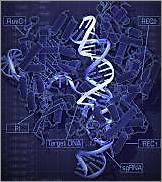
The gene-editing technique known as CRISPR has generated immense excitement for enabling scientists to alter genomes "with unprecedented precision, efficiency and flexibility," in hopes of accelerating cures for genetic diseases. However, while CRISPR has been receiving the lion's share of attention in the media, a new article in Scientific American outlines its limitations: as researchers have used CRISPR, particularly the Cas9 tool, they've been reminded "how fragile every new technology is," according to George Church of the Harvard Medical School. The article describes several alternatives that researchers hope will offer more precise pathways for rewriting DNA, which plant scientist Daniel Voytas of the University of Minnesota notes is essential to the advancement of the field: “Everyone says the future is editing many genes at a time, and I think: ‘We can’t even do one now with reasonable efficiency.'" Each month seems to bring new advances in the field: read the article, which provides an up-to-date overview of what's happening, here.